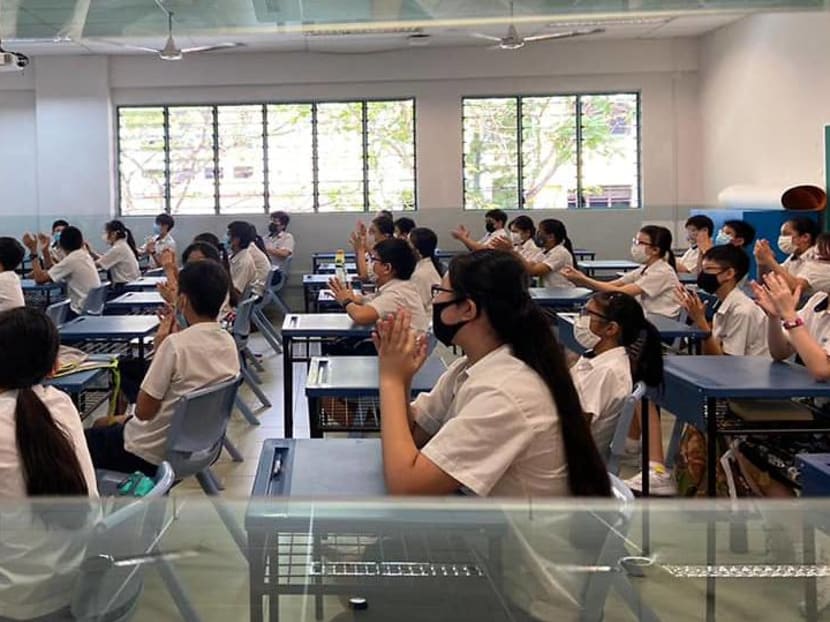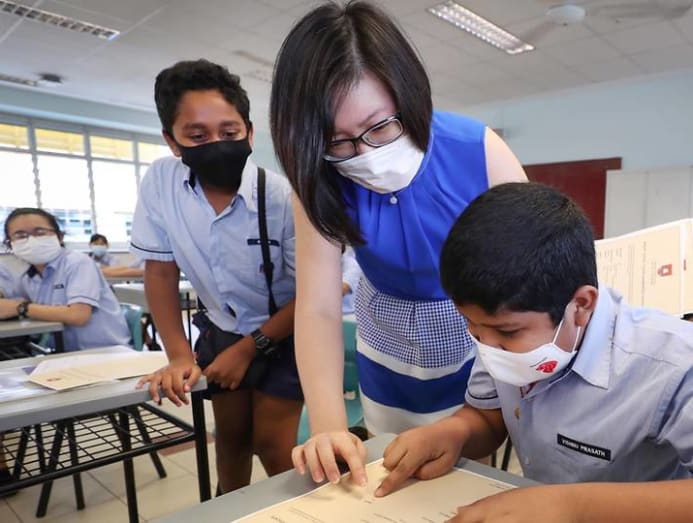Commentary: The biggest test on PSLE results day is one for parents
While the anxiety is real, the way we respond to the grades our children get makes a huge difference to a child, says June Yong.

A Primary 6 class from Unity Primary waiting to receive their PSLE results on Nov 25, 2020. (Photo: Facebook/Lawrence Wong)
SINGAPORE: If you are a parent of a Primary 6 student, you may start feeling increasingly tense as PSLE results day draws near.
On that day, it will be our turn to take a test and it will be exceptionally difficult to pass if our child’s results turn out lower than expected.
Our performance will have little to do with textbook knowledge, and everything to do with practising what we preach – in showing empathy, supporting our children, and loving them unconditionally.
In recent years, the spotlight has been on parents’ unique role in protecting their children’s mental wellbeing – one key aspect being their ability to manage academic pressure.
We know we have to resist comparing our children’s achievements to others, to focus on the process of learning and not the outcome, and not to react to poor grades with a do-or-die attitude.
I’ve been doing my best to put these into practice with my 12-year-old. Especially when I saw her putting a lot of pressure on herself, we tried to shift her focus away from grades to the small but concrete steps forward she’s made.
For example, she used to get overwhelmed whenever she had to write a Chinese composition from scratch. But soon she was able to craft a piece covering all the details shown in the picture, with some beautifying phrases here and there.
Before I wrote this piece, I asked my daughter if she felt anxious about her results. And I was surprised when she replied coolly: “What’s there to be anxious about? The results won’t change!”
I am sure she worries about it but I hope all the conversations we’ve had this year – about how the PSLE does not measure her worth as a person – have been worthwhile.
Yet this doesn’t absolve me from thinking about how I will respond on results day.
WHERE DOES FEAR OF EXAMS COME FROM?
Most children start off their academic journey with an exam-neutral attitude. It is how parents respond to the first unsavoury grade that sets the tone.
Research has shown that children learn from observing others. The classic visual cliff experiment by Joseph Campos of the University of California demonstrated how infants took reference from their mother’s facial expression to guide their behaviour in an uncertain context.
When the mother showed a fearful face, the baby does not cross the visual cliff. If the mother shows an encouraging expression, the child is more likely to overcome the challenge.
Similarly, a young child only learns how much his performance on a test matters when he brings home his first poor grade. Of course, by this time they are also referencing the reactions of their teachers and friends in school.
But as parents, we can control how intentional we are in expressing our feelings about education and learning, because children are masters of non-verbal cues, whether we are aware or not.
A survey conducted by Focus on the Family Singapore of over 1,050 school children (aged 10-15) in 2020 found that children feel more worried about their exams than the COVID-19 situation. Seven in 10 children felt negatively about the year-end examinations, with more than three in five reporting they felt "worried".
One indicator of how badly parents react to test scores is the level of fear the child experiences when he gets a test back.
A friend recently discovered in her Primary 4 class chat that some boys in her child’s class had hidden their test papers (or at least dragged their feet in showing them to their parents). One child even lied and said the grade was over a lower total score, in a bid to overstate his own performance.
Such stories make me think, when children as young as 10 conceal information from their parents, it is a sign that perhaps they have come to see failure as shameful.
Are society’s high expectations and often singular definition of success to blame?
A DELICATE BALANCE
To be clear, there is nothing wrong with setting high standards. The opposite – where we hold a nonchalant attitude towards studies or punctuate every single performance with effusive praise and accolade – isn’t ideal either.
Parents should also be careful in how we respond to children who do very well and encourage them to be humble and modest about their results.
Lydia DeFlorio and Amber Beliakoff’s 2015 study found that families from higher socio-economic strata tend to hold higher expectations for their children’s academic success. By the time their children are five, these expectations predict children’s math achievement.
While there is nothing wrong with having high expectations, we do have to be realistic. And a lot of this depends on what your child is like.
My middle child would argue (rather convincingly too) that there is nothing wrong with being average. He puts in a reasonable amount of effort on his studies (with lots of time for play leftover) and obtains respectable results.
Despite my initial chagrin, I’ve come to accept that if these are the goals he has set for himself, then perhaps I shouldn’t breathe down his neck to push him for that few extra marks.
Seeing his own efforts bear fruit should be motivation enough to keep him going in the right direction.
To what extent do PSLE grades shape your life? Three working adults spill their biggest revelations decades after on CNA's Heart of the Matter podcast:
NIPPING OUR OWN FEARS
But it is not easy to let go. After all, haven’t we been brought up to value excellence? Which may be why it is so hard to take failure or a low score in stride.
Perhaps the key is to look inward and examine our own emotions and fears about grades. How did our parents react to our failures, were we ashamed of our own results?
While MOE has removed a chunk of exams in the lower primary and lower secondary years, exams are still a big part of assessing a child’s learning and in the absence of other things, there is a tendency to hyper focus on it.
The truth is, there are many dreams and fears embroiled in a single PSLE score.
We fear that the child will end up in less desirable school, or worst, mix with the wrong crowd. We dream of the day they would earn a scholarship or can say with pride they got into a top school.
The emotions we tie to PSLE often stem from our own unmet needs or unexpressed fears, but it’s important to know they can cause even the most well-intentioned parent to trip up.
I often remind myself that every child is special – one may not be inclined towards math, another may not be great at languages. But they can sing, write, or fix things. They are loving and kind and all of these should be celebrated.

THE KEY TO A COMPASSIONATE RESPONSE
Despite my daughter’s cool attitude, I do catch myself taking short breaths as the day looms near. If she gets an unexpectedly poor result, will my face match the words I’ve preached?
To prepare for different scenarios, we drew up a list of possible schools to apply for, covering a wide range of cut-off points. The last thing I want her to feel in the event of disappointing results is that she has no options.
“Regardless of where you land, I believe you’ll be able to thrive there,” I told her, and my end of the bargain is to mean every word of it.
Research has shown that authoritative parents set high standards for their children, but also provide warmth and affection. When children fail to meet those expectations, these parents tend to be more forgiving and supportive, rather than punitive.
The tough part is therefore, separating the person from the performance.
We can acknowledge our own fears and allow ourselves to feel disappointed and yet still convey our unconditional love for the child. This keeps their sense of self intact, unscathed and unshaken by poor grades.
Only by holding space for our children to fall and supporting them as they pick themselves up again will we be able to ace this test.
June Yong is Lead of Insights at Focus on the Family Singapore and owner of MamaWearPapaShirt, a blog that discusses parenting and education in Singapore.












